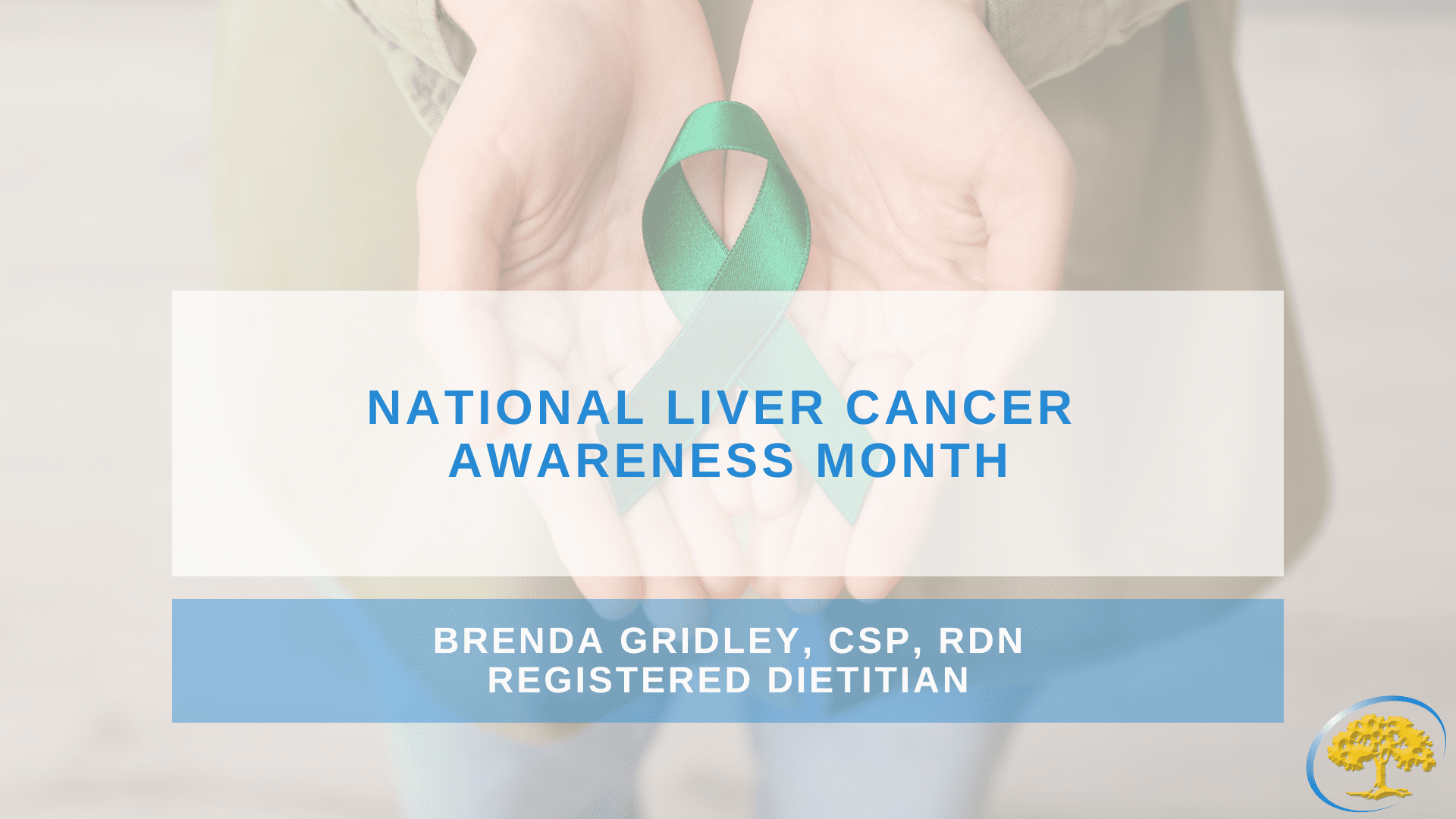
Posted 1 year ago
National Liver Cancer Awareness Month
Hepatocellular carcinoma (HCC), the most common type of liver cancer, develops because of cirrhosis. Compared with other types of cancer, liver and intrahepatic bile duct cancer is relatively rare, being the 13th most common type of cancer in the U.S. Liver cancer is the fifth most common type of cancer for males and the eighth most common type for females. Prevalence of risk factors for HCC can differ according to a person’s race, ethnicity, and sex.
Risk factors for HCC include:
– underlying liver disease
– smoking
– obesity
– heavy alcohol use
– diabetes
– male
Nutrition plays a vital role in supporting the overall health of individuals with liver cancer. Proper nutrition can help maintain strength, improve treatment outcomes, and enhance quality of life.
Here are some key nutritional considerations for people with liver cancer:
High-Protein Foods
– Importance: Protein is essential for tissue repair, liver regeneration and maintaining muscle mass, especially during cancer treatment. However, individuals with active liver disease should consume in moderation. Sometimes protein restriction ~ 40-60 gm a day is necessary to prevent hepatic encephalopathy (high Ammonia levels).
– Sources: Lean meats (chicken, turkey), fish, eggs, dairy products, legumes (beans, lentils), tofu, and protein supplements if needed.
Healthy Fats
– Importance: Fats provide a concentrated source of energy, which is crucial for those who may struggle with appetite loss. Healthy fats support liver function and reduce inflammation.
– Sources: Olive oil, avocados, nuts, seeds, and fatty fish such as like salmon and sardines, which are rich in omega-3 fatty acids.
Carbohydrates
– Importance: Carbohydrates are the body’s primary energy source. They should come from nutrient-dense foods that also provide fiber, vitamins, and minerals.
– Sources: Whole grains (brown rice, oats, quinoa), fruits, vegetables, and legumes.
Hydration
– Importance: Staying hydrated is crucial, especially if treatments cause diarrhea or vomiting, which can lead to dehydration. Adequate hydration is also essential for liver detoxification and overall health.
– Sources: Drink plenty of water throughout the day. Herbal teas and broths can also contribute to fluid intake. Avoid sugary drinks and limit alcohol intake.
Vitamins and Minerals
– Importance: Cancer and its treatment can lead to deficiencies in vitamins and minerals, which are critical for overall health. Consume antioxidant rich foods as these can protect the liver from damage caused by free radicals.
– Sources: Fruits and vegetables, particularly those rich in vitamin C (oranges, strawberries, bell peppers) and vitamin E (almonds, sunflower seeds, spinach). Berries, such as blueberries and cranberries, are also excellent sources of antioxidants.
– Aim for a balanced diet with a variety of fruits, vegetables, and whole foods. Supplements may be necessary if deficiencies are identified but should be taken under medical supervision.
Incorporate Cruciferous Vegetables
– These vegetables contain compounds that support liver detoxification and enzyme production.
– Sources: Broccoli, Brussels sprouts, cauliflower, kale, and cabbage.
High-Fiber Foods
– Importance: Fiber aids in digestion and helps regulate blood sugar levels, reducing strain on the liver.
– Sources: Whole grains (brown rice, oats, quinoa), legumes (beans, lentils), fruits (apples, pears, berries), and vegetables (carrots, leafy greens).
Include Garlic and Onions
– Importance: These foods contain sulfur compounds that support liver detoxification.
– Sources: Fresh garlic, onions, and leeks.
Herbs and Spices
– Turmeric: Contains curcumin, which has anti-inflammatory and antioxidant properties that support liver health.
– Milk Thistle: Often used as a supplement for liver health, milk thistle may help protect liver cells and promote regeneration.
Small, Frequent Meals
– Importance: Large meals can be overwhelming, particularly if the liver is compromised or if there is nausea and early fullness.
– Strategy: Eating smaller, more frequent meals can help maintain energy levels and prevent malnutrition.
Avoiding Certain Foods
– Alcohol: Should be avoided as it can further damage the liver. Excessive alcohol can cause liver damage, leading to conditions like fatty liver, hepatitis, and cirrhosis.
– High-Sodium Foods: Excessive salt can contribute to fluid retention and high blood pressure, which can strain the liver. Sources to limit: Processed foods, canned soups, salty snacks, and fast food.
– Raw or Undercooked Foods: To reduce the risk of infections, especially for those with weakened immune systems.
– High sugar foods/beverages: High sugar and refined carb intake can lead to fatty liver disease. Sources to avoid: Sugary drinks, candies, pastries, white bread, and processed snacks.
Managing Side Effects
– Nausea: Ginger tea, small meals, and avoiding strong odors may help.
– Loss of Appetite: Focus on nutrient-dense foods and possibly incorporate nutritional supplements such as Ensure, Boost, Premier Protein or Orgain.
– Taste Changes: Use herbs, spices, or marinades to improve the flavor of foods.
Manage Body Weight
– Importance: Maintaining a healthy weight reduces the risk of non-alcoholic fatty liver disease (NAFLD).
– Strategy: Combine a balanced diet with regular physical activity.
Brenda Gridley, CSP, RDN
Brenda is originally from Los Angeles, CA where she attended California State University of Los Angeles for her under graduate degree in Nutritional Science. She began her career with Kaiser Permanente in 2004. Throughout her professional development, she has worked in Cardiology and open heart surgery, Renal/Dialysis, organ transplants and Oncology, including chemotherapy, radiation and head and neck. Brenda has extensive experience with weight management programs, including Bariatric and finally Eating disorders and mindful eating. She went on to specialize in the Pediatric population and has maintained her Certification in Pediatric Nutrition since 2011. Areas she has managed include pediatric and neonatal intensive care units where she was responsible for individualizing therapeutic diets and alternate nutrition support based on specific metabolic needs, medical conditions, and cultural preferences.
Her passion for nutrition was developed at a young age and reared by her grandmother who always instilled the importance of a healthy diet and active lifestyle. When her grandmother became ill, Brenda became aware of the impact nutrition plays in disease prevention and maintaining overall mind and body health. She cared for grandmother until she passed and has made it her goal to help others achieve their full “nutrition potential” with using a culturally sensitive holistic approach.
She is married with two beautiful daughters and in her spare time she enjoys watching movies with her children, experimenting with new recipes, reading mystery novels, running and Yoga.
Please ask your Ironwood Cancer & Research Centers provider for a referral to see our dietary counselors.

